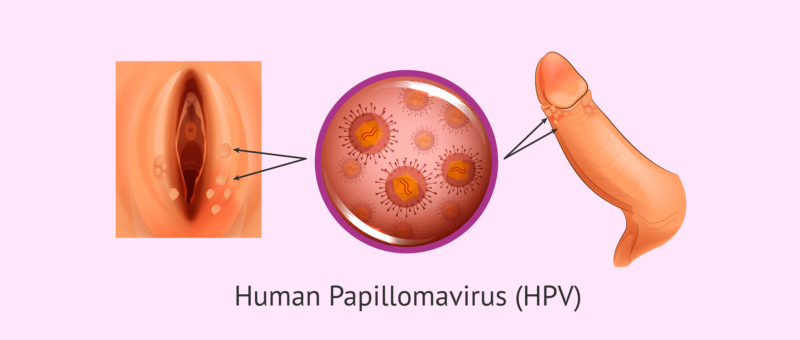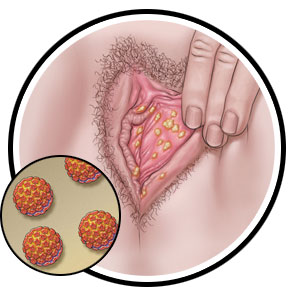Human Papillomavirus (HPV)
Human papillomavirus (HPV) is a very common virus that’s passed through sexual contact. There are more than 100 types of HPV, but only a few of them cause problems like genital warts and cancer. Most people with HPV don’t have any symptoms and don’t know they have it. In fact, up to 80% of people will get HPV at some point in their lives. And for most people, their body will fight off the virus and they won’t have any problems.

How Human papillomavirus is diagnosed and treated.
There are no blood tests for HPV, so it’s often diagnosed when people have abnormal results from a Pap test. Pap tests are routine exams that check for changes in the cells of the cervix. The most common way to treat HPV is to watch and wait, as many people’s bodies clear the infection on their own. However, sometimes treatment is needed, such as removing genital warts or abnormal cells from the cervix.
Genital warts
Genital warts are a symptom of HPV, and they are small, flesh-colored bumps that can appear on the genitals or around the anus. They can be itchy, uncomfortable, and sometimes painful. They can also be embarrassing and cause a lot of stress and anxiety. However, genital warts are usually not harmful and can be treated. Check out warts solution
There are several treatment options available, such as cryotherapy, laser therapy, and surgery. Cryotherapy is a treatment where liquid nitrogen is used to freeze off the warts. Laser therapy uses a laser to remove the warts. And surgery involves cutting off the warts with a scalpel. Each of these treatments has its own advantages and disadvantages, so it’s important to discuss your options with a healthcare provider.

Read about genital warts.
Other diseases that can be caused by human papilloma virus
HPV can also cause:
- Cervical cancer
- Anal cancer
- Vaginal cancer
- Vulvar cancer, and
- Penile cancer.
However, these cancers are very rare, and most people with HPV never develop cancer. The best way to prevent these cancers is to get regular screenings and to get the HPV vaccine.
How to prevent HPV
The best way to prevent HPV is to get vaccinated against it. The HPV vaccine is recommended for people ages 9 to 26. The vaccine protects against the types of HPV that cause most cases of genital warts and cervical cancer. It’s also important to practice safe sex, which includes using condoms every time you have sex. And finally, it’s important to have regular Pap tests to screen for cervical cancer.
Some common myths and misconceptions about HPV
Myth 1: HPV is only spread through sex
Human papilloma virus can be spread through any type of skin-to-skin contact, including hugging, kissing, and sharing towels. The virus can also be spread through oral sex and anal sex. So it’s important to understand that anyone can get HPV, regardless of their sexual history.
How is HPV spread through kissing?
While it’s not as common, HPV can be spread through kissing. This is because HPV can be found in the mouth and throat, not just on the genitals. So when someone with HPV kisses another person, there is a small chance that the virus could be transmitted. However, this is still relatively rare, and most people who kiss someone with HPV do not develop the virus. That said, if you are concerned about HPV, you should talk to your doctor about your risk factors and whether you should get the HPV vaccine.
Myth 2: condoms can’t protect against HPV
The truth is that condoms can help reduce the risk of HPV, but they are not 100% effective. This is because HPV can be spread through skin-to-skin contact, which can happen even when using a condom. However, using a condom is still important for protecting against other sexually transmitted infections (STIs) and for preventing pregnancy. So while condoms are not 100% effective against HPV, they still offer many benefits.
Myth 3: HPV is only spread through sex
As we’ve discussed, HPV can be spread through any type of skin-to-skin contact, including hugging, kissing, and sharing towels. The virus can also be spread through oral sex and anal sex. So it’s important to understand that anyone can get human papillomavirus, regardless of their sexual history. Another common myth is that HPV can be cured. This is not true – once you have HPV, it stays in your body for life. However, your body is usually able to fight off the virus and prevent any problems from occurring.
Myth 4: HPV can be cured.
While it is true that there is no cure for HPV, that doesn’t mean that there is no way to treat it. There are many treatment options available, and most people with HPV have very few symptoms and never need treatment. However, for those who do have symptoms, there are many effective treatment options available. So while HPV cannot be cured, it can be managed and treated.
Myth 5: HPV always causes symptoms.
This is also not true – most people with HPV don’t have any symptoms and don’t even know they have the virus. So it’s important to get regular screenings for HPV, even if you don’t have any symptoms. The final myth is that HPV is only a problem for women. This is also not true – HPV can affect people of all genders. So it’s important for everyone to be informed about HPV and to get the HPV vaccine if they are eligible.
Your Wellness Is Our Concern At Fekomi Wellness
Our caring team of Fekomi wellness experts can help you with your health concerns. Visit Fekomi Wellness for men’s health to get started. Kindly call our desk line on +2349074197154 for more enquiries.

